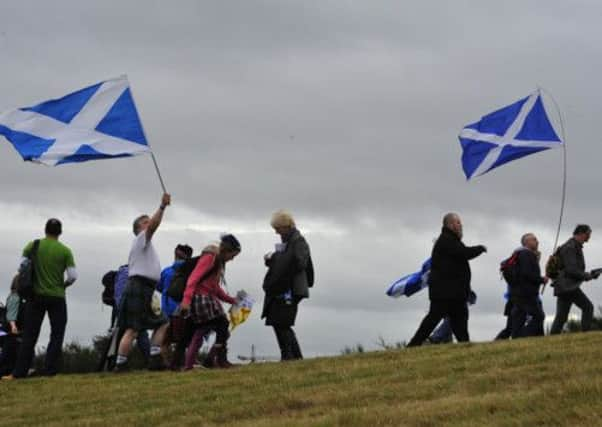Ian Smart: Harsh realities we’ll have to agree on, whatever the result


I think he initially thought that I might just vote for him, but in that I am afraid he was quickly disillusioned. Political tribalism is political tribalism.
Nonetheless, it quickly became clear that we shared many ideas in common. That, no matter how brutal the Thatcher clearances had been in Scotland, there was nonetheless no way back. That the future of small advanced economies lay not in heavy industry but in heavy thinking. And indeed, that the 1997 devolution settlement could not be the end of the road.
Advertisement
Hide AdAdvertisement
Hide AdHaving failed to become the constituency MSP in 1999, Andrew did, however, get into the parliament that year on the list. He then featured in that famous photograph of the first “reconvened” parliament in which I would have given my eye teeth to feature myself. A parliament where he was, on any view, one of the most thoughtful participants in our public debates. And he also “hung aboot” Cumbernauld and Kilsyth, hoping to get a “real” seat. Until 2003, when he failed to take the constituency by a mere 520 votes before, as a result of the internal fratricide which bedevils all parties, being placed so low on the list by his own fellow members that he was ejected from the parliament altogether. In that regard, he might, in his dotage, have cause to reflect that suggesting we should support England, in our own absence, during the 2002 World Cup would have been a hard sell in the Scottish Labour Party, never mind the SNP.
But then, and since, we have kept in touch, and then, and since, party politics aside, have agreed far more than we have ever disagreed. But, for party politicians at least, party politics are important.
So, in this very column, Andrew has felt obliged over the past few weeks to maintain the position that there is still all to play for in the referendum. And, who knows, he might even believe that. But I have my doubts. Polls are chiels that winna ding. And every poll, perhaps most importantly the recent school poll from Aberdeenshire, where no element of sampling error could excuse the result of only one in four pupils wanting independence, indicates that the Nationalists are heading for a defeat of crushing proportions.
And, on one view, good. That the “England is the source of all our ills” brigade within the nationalist ranks are finally put in their place will give me no small pleasure. Even more so, those whose hatred of the English is only exceeded by their hatred of the Labour party.
But all the problems of Scotland that Andrew and I have discussed down the years since 1999, over the phone or over the occasional pint, won’t go away as a result. They will still be there on 19 September next year. Problems of chronic ill health; welfare dependency; increasingly, in Scotland, the country of John Knox of all places, in educational underachievement. And Andrew’s belief, and mine, that constitutional reform is a key to unlocking these problems won’t have suddenly been discredited either.
That famous 1999 photograph of the reconvened parliament spoke to a new optimism in the land. But it has, to date, been an optimism unfulfilled. For my own party, Labour, the parliament has too often been seen as nothing much more than greater local government while, for Andrew’s party, insofar as a devolved parliament is good at all, still a poor substitute for something, to their mind, better.
Well, on 19 September next year we will all have to take stock. I’m very conscious that many of the bright young people in Andrew’s party may be in danger of leaving public life altogether in the aftermath of a No vote, while the equally bright young people in my own party will conclude that all the real prizes remain at Westminster.
That would, truly, be a disaster for Scotland.
On Friday last, “wee” Douglas Alexander (I’m really showing my age here) made a major speech on Scotland’s agenda beyond September 2014. Certainly, it involves further constitutional reform, but as a means rather than an end. More importantly, however, it suggested a greater honesty in admitting our challenges and in the need to take nothing off the table in confronting them. And earlier in the week, Alex Bell, the recently departed senior adviser to Alex Salmond, made, albeit from a different starting point, many of the same points.
Advertisement
Hide AdAdvertisement
Hide AdThe demography won’t change: an aging, and ailing, population coupled with a declining birth rate. Nor will the geography: peripheral to the United Kingdom, never mind Europe, never mind the world. Or the economics: that we will be, forever, in the shadow of our much larger neighbour. Or even the reality that our major natural resource, oil, is declining both in quantity and fashion.
But this is where we live. And where we want to continue to live. So surely it is not beyond us to find politicians equal to that challenge.
Ian Smart is a Scottish Labour activist, a veteran home rule campaigner and a past president of the Law Society of Scotland
Twitter: @ianssmart